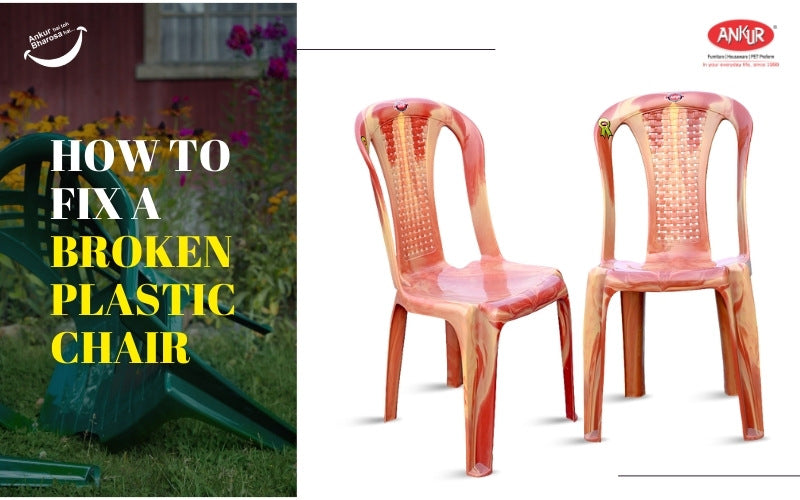Plastic chairs are commonly found in Indian homes, used everywhere from children’s playrooms to dining areas. These chairs are popular because they are affordable, durable, and easy to buy online. However, over time, even the best plastic chairs can develop cracks or start to wobble due to regular use. Instead of throwing them away, you can easily repair them at home using basic tools and simple methods.
This easy-to-follow guide explains step by step how to fix a broken plastic chair, helping you save money and reduce plastic waste. Whether you bought your chair from an online store or a local market, these practical solutions will help you restore its strength and stability. Follow the instructions carefully, and give your plastic chair a second life without the need for expensive replacements.
Table of Contents
- Why Do Plastic Chairs Break?
- Tools and Materials You Will Need
-
How to Permanently Repair a Broken Plastic Chair – Step-by-Step Practical Guide
- Step 1: Inspect the Chair Thoroughly
- Step 2: Clean and Prepare the Damaged Area
- Step 3: Add Structural Support Using Metal Wire
- Step 4: Secure the Wire Firmly
- Step 5: Apply Strong Adhesive to Seal the Repair
- Step 6: Trim and Smooth Excess Material
- Step 7: Repaint the Chair (Optional)
- Step 8: Test the Chair for Stability
- Simple Tips to Prevent Future Damage to Plastic Chairs
- When to Replace Plastic Chairs Instead of Repairing
- Final Words
Why Do Plastic Chairs Break?
Before learning how to repair plastic chairs, it is important to know why they break in the first place. The most common reasons are:
- Overuse or Heavy Weight: Sitting or standing on plastic chairs beyond their weight limit can cause them to crack, especially children’s chairs, which are often used roughly during playtime.
- Sunlight Exposure: Plastic chairs kept outdoors can become brittle over time due to constant exposure to sunlight and UV rays.
-
Poor Design or Low-Quality Materials: Some plastic chairs focus more on appearance than strength, which results in weak joints or thin legs that break easily.
-
Accidental Damage: Chairs may crack or break when accidentally dropped or knocked over.
Even high-quality plastic chairs bought from trusted online stores like Amazon or local shops can wear out with regular use. The good news is that most of these issues can be easily repaired with simple tools and methods.

Tools and Materials You Will Need
To repair your broken plastic chair, you will need a few basic tools and materials:
- Screwdriver: For tightening loose screws or removing damaged parts.
- Drill: To make holes for screws or brackets if needed.
- Sandpaper (120-grit): To smooth rough surfaces, ensuring better bonding.
- Epoxy Glue or Plastic Adhesive: Ideal for fixing small cracks. (For children’s chairs, use non-toxic adhesives.)
- Plastic Welding Kit: Useful for major breaks; it usually includes a heat gun and welding rods.
- Clamps: To hold parts firmly together while the glue sets.
- Fibreglass Tape or Metal Brackets: To strengthen weak or broken sections.
- Spray Paint (Optional): To refresh the chair’s appearance after repair.
- Safety Gear: Gloves and safety glasses to protect your hands and eyes.
These tools and materials are easily available at local hardware stores or online platforms like Amazon or Home Depot.
Pro Tip: When repairing children’s plastic chairs, always use non-toxic glue to ensure safety.
How to Permanently Repair a Broken Plastic Chair – Step-by-Step Practical Guide
If your plastic chair is broken and you want to repair it in a way that ensures long-lasting strength, follow this detailed step-by-step method. Whether it's a kids' chair or a standard plastic chair at home, this guide will help you fix it properly so it won’t break again.

Step 1: Inspect the Chair Thoroughly
First, carefully examine the chair to identify all the damaged areas. Look for cracks, loose joints, or completely broken parts, especially near the legs and seat. Understanding the extent of the damage will help you determine how much repair work is needed.

Step 2: Clean and Prepare the Damaged Area
Remove any loose plastic pieces around the damaged area using pliers or a cutter. Clean the area well using soap and water to remove dust, grease, or any debris, then dry it completely. Lightly sand the area using 120-grit sandpaper to create a rough surface that will help adhesives stick better.

Step 3: Add Structural Support Using Metal Wire
Take a strong metal wire (about 1 to 2 millimetres thick) and thread it through both sides of the damaged section of the chair, bridging the broken area. Make sure the wire passes completely through so it can hold the structure together from the inside. Leave enough wire on both ends so you can bend or lock it in place.
This internal wire provides a mechanical lock, which prevents the chair from breaking again, unlike relying solely on adhesives.

Step 4: Secure the Wire Firmly
Bend the ends of the wire securely around the chair frame, ensuring it cannot slip out. For a stronger fit, heat the plastic slightly using a small torch or heat gun where the wire passes through. This allows the plastic to soften and hold the wire more tightly once cooled. Take care not to overheat the plastic.
Once properly secured, the wire should stay in place without moving.

Step 5: Apply Strong Adhesive to Seal the Repair
Next, use a high-strength plastic adhesive or epoxy resin designed for plastic materials. Apply it generously over the wire and the cracked areas, fully covering the gaps and cracks. Press the parts together firmly and use clamps if needed to hold everything in position.
Allow the adhesive to cure as per the manufacturer’s instructions, typically for 24 hours, ensuring a strong bond.

Step 6: Trim and Smooth Excess Material
After the adhesive has fully cured, trim any excess wire or plastic using cutters or pliers. Smooth the repaired area with sandpaper so that it is neat and doesn’t have sharp edges.

Step 7: Repaint the Chair (Optional)
For a fresh, clean look, you may spray-paint the repaired area using a paint designed for plastics. Apply two to three thin coats of paint, allowing each coat to dry before applying the next.
This will not only improve appearance but also offer additional protection to the repair area.

Step 8: Test the Chair for Stability
Finally, gently press and sit on the repaired chair to check if the repair holds up. The chair should no longer wobble, and the repaired section should feel sturdy and secure.
This step-by-step process provides a strong and long-lasting solution for repairing broken plastic chairs. Unlike regular adhesives that can fail under pressure, this method uses mechanical reinforcement and proper adhesive application, making your chair reliable again.
Simple Tips to Prevent Future Damage to Plastic Chairs
To keep your plastic chairs strong and in good condition for a long time, follow these easy tips:
-
Store Indoors When Not in Use
Keep plastic chairs, especially kids’ chairs and outdoor ones, away from direct sunlight. Store them in a garage, shed, or covered area to prevent UV damage, which makes plastic brittle over time.
-
Follow Weight Limits
Do not sit more people than the chair is designed for. Check the weight limit mentioned in the product description when you buy plastic chairs online, and avoid overloading them.
-
Do Regular Checks
Every month, check screws and joints to make sure nothing is loose or broken. Tighten any loose screws to avoid wobbling or further damage, especially if you bought the chair online.
-
Use UV-Protectant Spray
To protect outdoor plastic chairs from sunlight, use a UV-protectant spray like 303 UV Protectant. It helps prevent the plastic from becoming weak or faded. These sprays are available at hardware stores or online.
By following these simple steps, your plastic chairs will stay strong, safe, and good-looking for years.
When to Replace Plastic Chairs Instead of Repairing
If your plastic chair is too damaged to repair properly, it’s better to replace it. Trying to fix chairs with serious damage can be unsafe and won’t last long. Instead of spending time and effort on temporary fixes, you can explore a wide range of plastic chairs online that are designed for home, kids, and outdoor use.
When looking for plastic chairs, consider these common types:
Modern Plastic Chairs
These are stylish, durable chairs designed for everyday home or office use. They often come in sleek designs with sturdy construction, perfect for dining areas or workspaces.
Kids Plastic Chairs
Lightweight and safe, these chairs are specially made for children. They come in bright colors and child-friendly sizes, making them ideal for playrooms, classrooms, or kids’ outdoor areas.
Outdoor Plastic Chairs
Made from weather-resistant materials, these chairs are built to withstand sun, rain, and outdoor use. They are perfect for patios, gardens, or poolside seating.
If repair is not an option, you can easily purchase plastic chairs online and get safe, durable replacements delivered to your home. Choose the right type of plastic chair that fits your needs and ensures long-lasting comfort and stability.
Final Words
Fixing a broken plastic chair is easier than it seems. With a few basic tools, some effort, and this step-by-step guide, you can repair your kids’ plastic chairs, modern plastic chairs, or any plastic chairs for home use. This way, you save money, reduce waste, and extend the life of your furniture.
If repair is not possible, you can easily find and buy plastic chairs online to get durable and safe replacements. Whether you need chairs for home, kids, or outdoor use, there are many options available to suit your needs.

